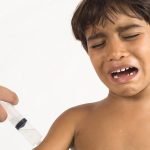There are some diseases of the past that we’ve all heard of — such as polio, measles, and the mumps — but, unless you are of a certain age, you probably don’t know anyone who has ever contracted one. Quite possibly, until now.
The biggest outbreak of measles in the United States in decades took place just a few months ago.1 Between January and May of 2011, 118 cases of measles were reported, which is close to twice as many as for the entire year of 2010. And let’s not forget that measles had been declared eliminated in this country in 2000. So how could this happen?
The disease is being reintroduced to the U.S. primarily by travelers who have not been vaccinated against it. According to the Centers for Disease Control and Prevention (CDC) in Atlanta, approximately 90 percent of the patients affected by the current outbreak were unvaccinated. The majority were Americans who traveled to Europe, where the measles problem has escalated well beyond an outbreak to reach epidemic proportions. Residents of 38 different countries there have contracted the disease and in France alone there are 10,000 reported cases and six deaths.
Part of the problem stems from the fact that babies are not vaccinated for measles until after their first birthday. Approximately 15 percent of the cases in this outbreak were children under one year old. Children and adults who have been vaccinated are not at risk to contract measles.
Which brings us to the other part of the problem. Since measles has been extremely uncommon in the U.S. in the past few decades, and immunization has been possibly linked to autism, there are parents who do not want to take the risk of subjecting their children to this vaccination. Certainly this is a valid choice when every other child in the neighborhood is vaccinated and there is virtually no chance of ever having your child exposed, but with the possibility of outbreaks occurring more frequently, are parents taking a bigger risk by not vaccinating their children? Take note that more than half of the children younger than five years old who contracted measles in the latest wave had to be hospitalized.
Over the last several decades, parents have been able to ride on the backs of all the other parents willing to accept the risks and immunize their children. Since that meant that their child would likely never be exposed to the disease, there was no need to vaccinate. But the game has changed. Enough parents have opted out of vaccination that measles is now staging a comeback. I’m not saying whether you should vaccinate or not — only that the ground rules have changed, the risk is now greater, and that needs to be factored into your decision.
According to the medical establishment, the MMR vaccine for measles is completely safe unless a child has a severely weakened immune system, such as those undergoing treatment for cancer. Sure! Unfortunately, the establishment does not have the greatest track record when it comes to honestly disclosing the risks associated with vaccines. On the other hand, vaccines can work, and the disease rate for measles has been reduced by 99 percent in the U.S. at least partially because of them.
The flip side of the coin, however, reveals the risks of vaccination that, although they may only affect a small minority of children, are very real. Reactions to shots can be much more serious than a simple soreness in the area and low-grade fever. In addition, Thimerosal, a mercury-based preservative, is still used in many vaccines, although not in the measles, mumps, and rubella (MMR) vaccine. As I said, the medical establishment and government bureaucrats are not necessarily the most honest voices when it comes to pronouncing on the dangers of childhood immunization. Even as government officials publically attest to the safety of childhood immunizations, the Vaccine Injury Compensation Program has quietly been paying out well over a billion dollars in damages over the years as the result of “mild reactions” to immunizations.
For now, we each have to make our own decisions about whether to vaccinate or not based on our knowledge and beliefs. While it has been relatively safe to opt out of vaccination for some time now — and more people have chosen that route each year — that may be changing. The increase in globalization, travel, and immigration from poorer to wealthier countries exposes us to childhood diseases we thought were long gone. It’s essential to weigh the risks of the disease against the risks of immunization, and only you can choose what you think is right for your own child.
1 McLean, Huong. “Measles–United States, January-May 20, 2011.” Centers for Disease Control and Prevention. 27 May 2011. Centers for Disease Control and Prevention. 28 July 2011. <http://www.cdc.gov/mmwr/preview/mmwrhtml/mm6020a7.htm>.












What makes me wonder about
What makes me wonder about the efficacy of vaccination is this:
At the age of 2 1/2 to 3, while I had been vaccinated with the measles vaccine at an earlier age (whatever age was set in 1960-1963), I nevertheless contracted the measles. This is also true with my older sister who also contracted the measles as a young child while having been vaccinated earlier (within 3 years).
Additionally, many of my cousins who had been vaccinated also contracted the illness (mind you, I have 10 aunts and uncles who each had 3 to 4 children).
Moreover, because of my curiosity, I have been active in questioning friends and such for their own experiences and have found that many also contracted the illness after having been vaccinated.
Even more,during the late 1970s I worked in a clinic as a medical assistant and bi-lingual interpreter, the nature of which exposes me to patients’ personal information and medical history, for more than 4 years with an average patient log of 125, and I was curious as to the result that many contract the virus they had been vaccinated against within a few months to a few years.
So how is it that the medical establishment maintains that vaccination results in immunity to the particular virus if one may still become infected and manifest the disease?
Why come to the agreement that it works….when it DOESN’T work many times??
It might well be that the reporting of those unvaccinated AND contracting the disease is strictly pursued, while those who have been vaccinated yet contract the illness are assumed “safe” and are not bothered to be reported. This makes for very sloppy, if not irresponsible, statistical analysis, to say the least.
Having THAT kind of “tracking” “record” WILL produce a result in that children who are not vaccinated are the only ones at risk and will also produce a picture of epidemic only amongst the UNvaccinated.
2 of 2
Moreover… while I
2 of 2
Moreover… while I worked closely with doctors at the clinic those years,I do not recall having a system where doctors reported adverse effects in vaccinated children, nor do I recall any such forms to fill, and PCs did not abound. (All staff rotated with the stocking of forms and all doctor supplies/instruments and such.) Unless these documents were received in their homes.
As a matter of fact, during many instances of “adverse reactions” patients were told that it was normal (and so if they believe it is normal to have a reaction, I would then conclude those will be reported even less).
And so the big question becomes:
Are all instances of illness and adverse effects being realistically reported regardless of vaccination??
Then another question arises:
Are vaccinations consistently and studiously being observed, recorded, and studied for ALL their adverse effects??
From my personal living experience the answers to those seem to be a BIG: NO
It seems to be that after the human releases as accepted any innovation into society, the monitoring of the effects of such innovation ceases – unless there is some further gains to be made from expanding on them.
We only have to look at our environment to see that truth reflected.
as i read your articles i see
as i read your articles i see that you are not as holistic as i would like and that i can no longer depend on even your research….
there are plenty of studies that say that measles would have declined even without the vaccines….as this is the pattern of any virus…
what is happening here is that the human race is totally terrified of dying….and it is fighting so hard against natural forces…i had measles…..it is not a terrible disease….i survived…most kids do….the fact that some die is just nature…as with the flu….some people just die….we as humans will never be able to control this…and vaccines are NOT the answer….
i am not trying to be cruel..but the more we try to fight nature we are depressing our immune systems as with vaccines….
i totally disagree with most of what you and i am sorry about that..
How many of the 118 cases HAD
How many of the 118 cases HAD BEEN VACCINATED?????
Stories such as this try to create fear and blame gets sent in the wrong direction.
I am completely disappointed
I am completely disappointed in this newsletter in that it seems to me to almost support vaccination. Measles is a harmless childhood disease that will actually give you complete immunity after recovery. For those who have underperforming immune systems or are in poor health, things can get trickier…but for the love of God…people used to send their kids to measles parties. It’s not a big deal as long as you let the child have the disease. what i mean by that is you cannot administer drugs that go against what the body is trying to do (aspirin or tylenol, antivirals or antibiotics). That is what will cause problems.
ps…vaccines did not save us… the death rates from childhood infections had declined by 90-95% before the introduction of mass vaccination campaigns.
perhaps you could read this
perhaps you could read this article on Measles and update your information….
http://www.naturalnews.com/033399_vaccines_measles.html
NOTE FROM JON BARRON:
I
NOTE FROM JON BARRON:
I realize vaccination is an emotional issue, but it is far more nuanced than most people acknowledge. As I have discussed on many occasions, some vaccinations have far more side effects than many doctors acknowledge and are often far less effective than many studies claim. On the other hand, some vaccinations tend to be more effective than zero.
That said, I suggest you reread Beth’s blog again. She was reporting on the results of a study and concluded, not by supporting the study, but by saying, “We each have to make our own decisions about whether to vaccinate or not based on our knowledge and beliefs.” Keep in mind that some of you out there believe that only a pure vegan diet is the ONLY healthy and ethical diet, whereas others believe that ONLY a Paleo diet, high in meat and devoid of all grains, sprouts, grasses, and legumes is natural. Keep in mind that if you restrict your information sources to only those sources that confirm what you already believe, then your ability to acquire new knowledge has ended as of this moment. You can only acquire new knowledge if you are willing to at least listen to opposing points of view and evaluate them objectively. That’s one of the reasons why I read so many medical journals.
In truth, the world of health is rarely about absolutes. No matter what your doctor might tell you, no matter what some alternative health expert might tell you, there are very few absolutes when it comes to health. Some people live perfectly clean lifestyles, detox regularly, avoid sugar, stay fit – and still come down with cancer. It happens! And some people, smoke a pipe all day long, drink over a dozen cans of Pepsi a day, have sex multiple times a week year after year and seem to pay no price health wise…continuing to live that lifestyle into their 80’s. Hugh Heffner has. In the end as I said in “Miracle Doctors,” health is about odds. The more things you do right, the better your chances of living healthy longer. The more things you do wrong, the worse your odds. There are no guarantees, just odds – and only you can decide what odds you want to play. And the same is true with vaccinations. There are no absolutes – only odds – and only you can determine what odds you want to play for yourself and your family.
For more on my position concerning childhood immunizations, check out http://www.jonbarron.org/natural-health/newsletter-childrens-immunizations-vaccinations-dangers
Interesting that a writer
Interesting that a writer speaks of a having a ‘complete immunity’ after contracting the measles.
As a child I had the measles several times – verified by our doctor – uncomfortable but hardly life threatening.
Regarding this particular
Regarding this particular immunization, I will NEVER give it to my children because the Rubella portion of it is cultured on aborted fetal cell lines. Most people, indeed, most DOCTORS are not even aware of this fact. While I have philosophical issues with most immunizations, this vaccination presents a religious/moral concern. I do not believe it is okay to kill babies in order to save lives or make someone else’s life somehow better. Life is precious and the way they obtained the aborted fetal cell lines for this vaccine is morally reprehensible. I will get a religious exemption for this immunization if/when the time comes. It is against my religion to murder babies, which is what was done for this vaccine. Unfortunately, there is no longer an option to get the measles/mumps vaccine separately from the rubella vaccine.
I understand that these babies are already dead and that it happened years ago. That does not lessen the fact that we are injecting our children with cells derived from babies who were murdered. You can get a better understanding of how this all happened at http://www.cogforlife.org. There is lots of info on this site regarding vaccines and ethical/medical concerns, including studies which link vaccines to autism. By the way, the Chicken Pox vaccine is also cultured on aborted fetal cell lines.
I believe the Creator made our bodies to heal themselves and there are alternative medicines (ex., herbal, homeopathic)which can assist the body in doing what it was created to do. Also, getting these diseases as children provides lifelong immunity, whereas vaccination does not, necessarily. Although one of my daughters had the MMR series of shots as a child, she had to have titers to prove immunity(due to our doctor’s office losing her records!)which showed no immunity to measles. At the time, single vaccines were available so she was able to get it (again!). I wonder how many people are walking around, thinking they are immune when they are not.
Not mentioned, but my wife
Not mentioned, but my wife always claims her ethical/moral reason for not vacinating. Is that MMR is partly cultured on aborted fetal cell lines. Anyone else ever hear this?
Beth maybe reporting on the
Beth maybe reporting on the results of a study and may also be saying that we have to make our own decisions, and out course that goes without saying. However she also says and I quote:-
“Over the last several decades, parents have been able to ride on the backs of all the other parents willing to accept the risks and immunize their children. Since that meant that their child would likely never be exposed to the disease, there was no need to vaccinate.”
It seems to me that she has missed the point. Parents are certainly not riding on the backs of those who immunize. These parents are making a very definite decision not to vaccinate their children because they consider the dangers of the vaccine to be far greater than the dangers of the disease itself. Each parent who makes this decision then has to live with the consequences one way or the other.
The dangers of the vaccine are not simply whether or not their child will become autistic. There are many more side effects of the vaccine that need to be taken into consideration. Non vaccinated children generally have a better level of natural immunity than vaccinated children and often have parents who choose good nutrition. There is always the exception that proves the rule and of course I am referring here to parents who make informed decisions not parents who don’t bother or just act on impulse because of articles they have read that scare them
I live in the UK (Europe) and I am unaware of a measles outbreak of epidemic proportions. I also have 3 very healthy grandchildren who have not been vaccinated.
I must admit, like others, I find the tenor of this article disappointing and unhelpful in a climate where parents are wanting clearer guidance on these sorts of issues.
I think Maryann got you on
I think Maryann got you on this issue mrs. Barron. Because it is kept away from public, but according to local health community (not cdc and others), most of contracted in measels outbreak in U.S. and Europe was regulary vaccinated.
Medicine is not an exact
Medicine is not an exact science. Everybody is different and therefore reacts differently to medicine and illnesses. Vaccines are not guaranteed to prevent illnesses but you increase the odds of not contracting them tremendously. There is no reason to leave your children vulnerable to illnesses that you can prevent.
To those of you who keep saying measles is no big deal obviously have never seen their child or relative hospitalized for it. Like I said, everybody reacts differently and just because you didn’t suffer complications from of the virus, does not mean the same is true for others. There are children who can not be vaccinated due to other medical problems but are contracting the virus because of parents who do not feel that they should vaccinate their children.
And to those of you who spout things like, stop putting medicine in your body, it’s unnatural or people die, that’s just what happens, I am extremely offended by these comments. You say these things so easily but if you or child maybe had cancer for example, I doubt you would hesitate to turn to medicine.
I understand people have their own opinions or beliefs but maybe you could try to be a little more considerate, do your research, and try to understand the opposition before making ignorant comments.
I was recently watching an
I was recently watching an interview with Bill Gates and Gates says and I quote “the autism connection to vaccines was a corrupt piece of science, the data was completely fraudulent”.
Here is that interview http://news.yahoo.com/video/newsmakers-26771768/bill-gates-talks-about-modified-foods-27974651.html
I am just curious as to where one of the richest and most influential men on the planet is getting his information from. What does he know that we don’t? Or on the flip side, how is it that someone like Bill Gates can still be in the “not know”?